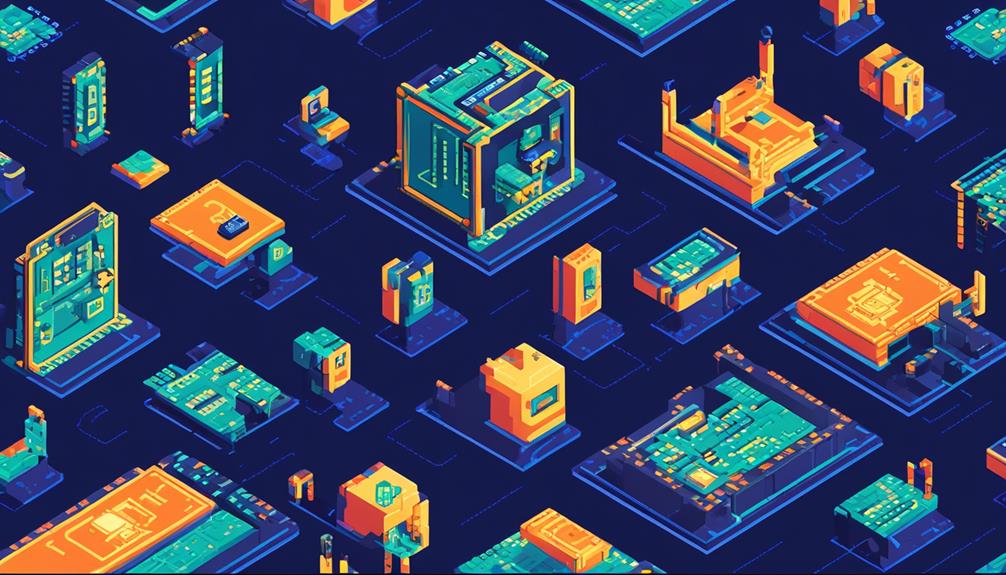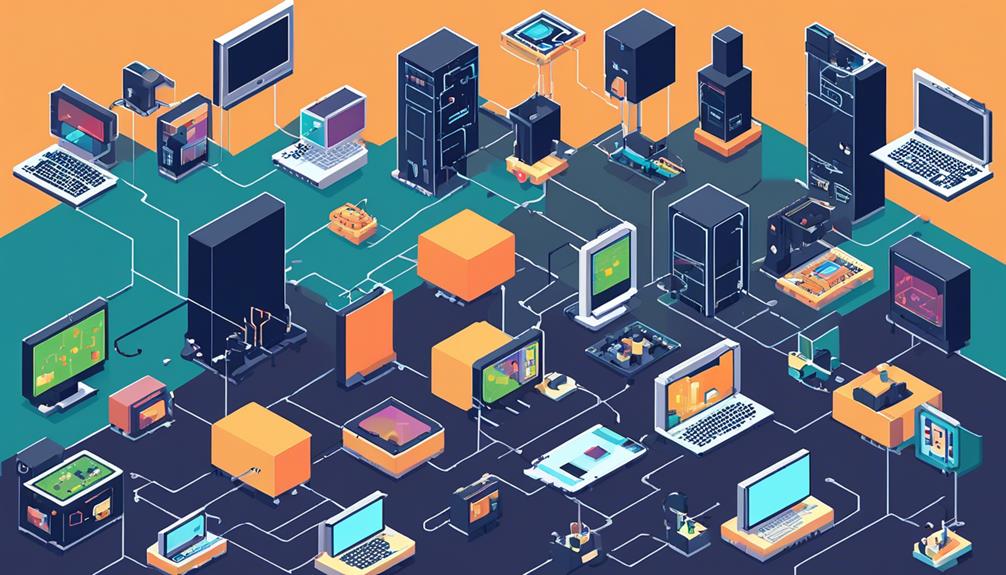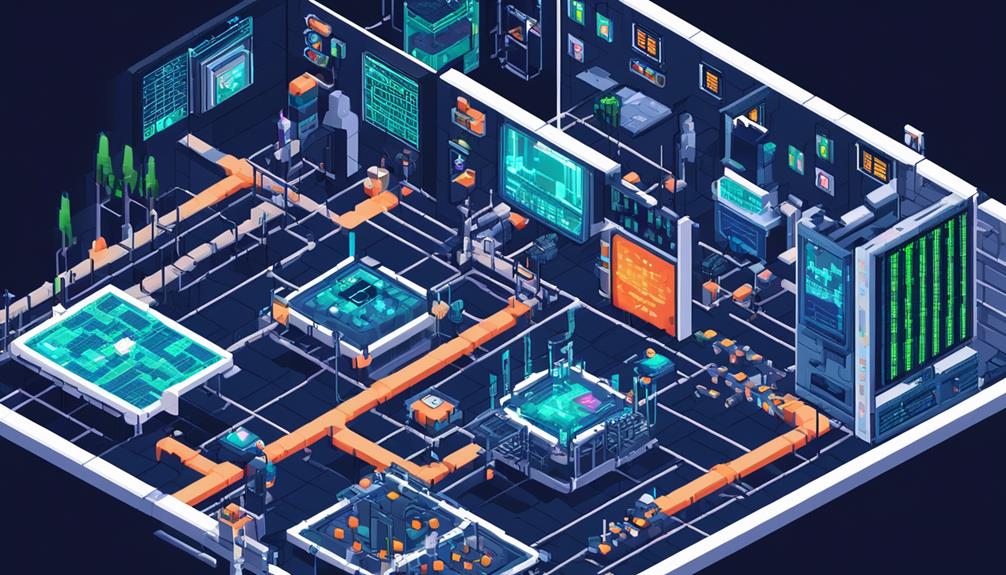In the rapidly evolving landscape of edge computing, ensuring the security of data at the edge has become a paramount concern for organizations. The proliferation of edge devices and the vast amounts of data they generate necessitate robust security measures.
This is where specialized hardware comes into play. By harnessing the power of edge servers, accelerators, and other hardware components, organizations can fortify their edge security and protect sensitive information from unauthorized access.
But what are the specific benefits of using specialized hardware for edge security? How can organizations effectively integrate these hardware solutions into their existing security strategies? And what future advancements can we expect in the realm of specialized hardware for edge security?
In this discussion, we will delve into these questions and explore the critical role that specialized hardware plays in enhancing edge security.
Key Takeaways
- Specialized hardware in edge computing improves performance and efficiency in processing and analyzing data at the edge.
- Hardware-based security measures play a critical role in fortifying data protection and preventing unauthorized access in edge computing environments.
- Future trends in specialized hardware for edge computing include emerging technologies like specialized edge AI chips and neuromorphic computing.
- Integrating specialized hardware into edge security strategies optimizes data processing, analysis, and safeguarding in edge computing environments.
Benefits of Specialized Hardware

Specialized hardware in edge computing offers significant improvements in performance and efficiency, enabling more effective processing and analysis of data at the point of generation. This specialized hardware includes hardware accelerators such as GPUs, which enhance processing capabilities, particularly for computationally intensive tasks like machine learning and computer vision in edge computing.
One of the key benefits of specialized hardware in edge computing is its ability to enhance security features. Hardware devices play a crucial role in safeguarding data security and privacy in edge computing. With advanced security features and encryption techniques, specialized hardware enables secure data processing and storage at the edge. This is particularly important in edge computing, where data is generated and processed at the edge devices, rather than being transmitted and processed in a centralized data center. By incorporating security features directly into the hardware, edge computing can better protect sensitive data and prevent unauthorized access or tampering.
Additionally, specialized hardware in edge computing empowers edge devices with enhanced processing capabilities. Specialized edge AI chips and emerging hardware trends promise more powerful and energy-efficient hardware components, enabling edge devices to handle complex tasks efficiently. This is especially beneficial for edge computing applications that require real-time analysis and decision-making, such as autonomous vehicles or smart surveillance systems.
Furthermore, edge computing decentralizes data processing, minimizing potential points of vulnerability and enhancing IoT security. By processing data at the edge devices, edge computing reduces the need for data transmission to centralized data centers, reducing the risk of data breaches during transmission. With specialized hardware, edge computing can provide secure and efficient processing and analysis of data, enabling organizations to leverage the benefits of edge computing while ensuring data security and privacy.
Types of Specialized Hardware for Edge Security
When it comes to edge security, there are several types of specialized hardware options available.
These hardware options provide enhanced security benefits for edge computing environments. By leveraging hardware accelerators like GPUs and specialized chips, edge devices can perform complex tasks such as machine learning and computer vision efficiently.
Additionally, edge servers act as intermediaries between edge devices and the cloud, enabling real-time decision-making and optimized customer experiences while ensuring data security and privacy through advanced security features and encryption techniques.
Hardware Options
Hardware options for enhancing edge security include:
- Specialized devices that provide localized processing, storage, and networking capabilities at the edge. These devices empower real-time decision-making and optimization in various industries such as smart retail applications.
- Edge servers, which are specialized hardware that enable faster, more informed decision-making by reducing latency and improving network efficiency.
- Accelerators, such as GPUs, that enhance processing capabilities by offloading computationally intensive tasks from general-purpose processors. This improves processing speed for applications like machine learning and computer vision.
- These hardware devices also play a crucial role in safeguarding data privacy and security. They incorporate advanced security features, encryption techniques, secure boot mechanisms, and trusted execution environments to protect sensitive information from unauthorized access.
The future trends in specialized edge AI chips, neuromorphic computing, and ARM chips, along with challenges related to hardware standardization and interoperability, further influence hardware design and performance for edge computing.
Security Benefits
With advanced security features and encryption techniques, specialized hardware devices in edge computing play a crucial role in safeguarding data security and privacy. These devices offer several security benefits, including:
- Secure Processing: Specialized edge AI chips accelerate machine learning and AI workloads while ensuring the integrity and confidentiality of the processed data.
- Enhanced Efficiency: Neuromorphic computing provides low-power, highly parallel computing capabilities, allowing edge devices to perform complex security tasks efficiently.
- Robust Design: ARM chips, widely adopted in edge devices, influence hardware design and performance, contributing to energy-efficient and secure solutions.
Importance of Hardware in Edge Computing Security

Specialized hardware plays a critical role in ensuring the security of edge computing environments. By incorporating advanced security features, such as encryption and secure boot mechanisms, hardware devices fortify data protection and prevent unauthorized access.
However, the diverse landscape of edge computing presents challenges in terms of hardware standardization and interoperability, necessitating a balance between performance and power efficiency.
Hardware Security Benefits
The pivotal role of hardware components in edge computing security cannot be overstated, as they provide localized processing, storage, and enhanced networking capabilities at the edge. Hardware-based security measures in edge computing play a crucial role in safeguarding data security and privacy, with advanced features protecting sensitive information from unauthorized access.
The benefits of hardware security in edge computing include:
- Protection against unauthorized access: Hardware devices in edge computing fortify data security through mechanisms such as secure boot, encryption techniques, and trusted execution environments, protecting data from unauthorized access and maintaining confidentiality.
- Enhanced performance and optimization: Specialized hardware in edge computing accelerates machine learning and AI workloads, delivering low-power computing capabilities, and influencing hardware optimization and performance. This addresses scalability and interoperability challenges in the diverse landscape of edge computing.
- Future-proofing edge computing: Future trends in hardware for edge computing, such as specialized edge AI chips and neuromorphic computing, empower edge computing with enhanced processing capabilities, ensuring the security and efficiency of data processing at the edge.
These hardware security benefits are essential for edge computing to provide robust data security and efficient processing capabilities.
Edge Computing Challenges
Hardware plays a vital role in ensuring the security of edge computing by addressing various challenges and vulnerabilities. Specialized hardware devices fortify data security in edge computing environments. These hardware-based security measures protect data from unauthorized access, ensuring the confidentiality and integrity of sensitive information.
However, the diverse landscape of edge computing hardware presents challenges in terms of scalability and interoperability. As organizations adopt edge computing solutions, they need to consider the compatibility between different hardware devices and systems.
Moreover, the rapidly evolving field of edge computing demands specialized hardware advancements to keep pace with emerging technologies. Future trends include the development of specialized edge AI chips and neuromorphic computing, which can enhance the security and performance of edge computing systems.
Enhancing Data Protection With Specialized Hardware
With the increasing need for enhanced data protection, the implementation of specialized hardware in edge computing has become crucial. Specialized hardware components in edge devices can provide a range of benefits for protecting data and ensuring its integrity. Here are three key ways in which specialized hardware enhances data protection in edge computing:
- Improved processing capabilities: Hardware accelerators, such as GPUs (Graphics Processing Units), can significantly improve the processing capabilities of edge devices. These accelerators enable faster and more efficient computation, allowing for real-time analysis and decision-making at the edge. By offloading computationally-intensive tasks to specialized hardware, computing resources can be better utilized, reducing the risk of data breaches or delays in data processing.
- Localized processing and storage: Edge devices equipped with specialized hardware components, such as edge servers, can provide localized processing and storage capabilities. This proximity to data sources minimizes the need for data transmission to centralized servers, reducing the risk of data exposure during transit. Additionally, localized storage allows for data to be securely stored and accessed locally, providing an extra layer of protection against unauthorized access.
- Hardware-based security measures: Specialized hardware can incorporate robust security measures to protect data from unauthorized access. Encryption mechanisms can be implemented at the hardware level, ensuring that data is encrypted at rest and in transit. Secure boot mechanisms can also be employed, verifying the integrity of the device's firmware and preventing unauthorized modifications. These hardware-based security measures provide a strong foundation for protecting sensitive data in edge computing environments.
Securing Edge Computing Environments With Hardware Solutions

To ensure the security of edge computing environments, the implementation of hardware solutions is paramount, leveraging advanced security features and encryption techniques. Hardware devices play a crucial role in safeguarding data security and privacy in edge computing environments. By bringing processing power and storage closer to where data is generated, hardware solutions in edge computing optimize customer experiences and enable real-time decision-making.
One way hardware solutions enhance security in edge computing is through the use of specialized hardware accelerators, such as GPUs. These accelerators offload computationally intensive tasks from general-purpose processors, increasing processing capabilities while maintaining data integrity. The use of hardware-based encryption techniques further strengthens the security of edge computing environments, protecting data in transit and at rest.
To provide a clear visualization of the importance of hardware solutions in securing edge computing environments, consider the following table:
| Hardware Solution | Security Benefit |
|---|---|
| Specialized Hardware | Optimizes processing and storage capabilities at the edge |
| Hardware Accelerators | Offloads computationally intensive tasks from processors |
| Encryption Techniques | Safeguards data in transit and at rest |
As edge computing continues to grow, the future of hardware for edge security looks promising. Specialized edge AI chips, neuromorphic computing, and ARM chip adoption are some of the emerging trends. However, challenges in standardization and interoperability must be addressed to ensure seamless integration of hardware solutions across diverse edge computing environments.
Key Considerations When Choosing Specialized Hardware
When selecting specialized hardware for edge computing environments, it is crucial to carefully consider the specific requirements and workloads of the system. The right hardware components can significantly enhance the performance, security, and efficiency of edge computing deployments. Here are some key considerations to keep in mind:
- Localization capabilities: Look for hardware components that provide localized processing, storage, and networking capabilities at the edge. These devices act as intermediary devices between edge devices and the cloud, reducing latency and bandwidth requirements.
- Hardware accelerators: Evaluate the need for hardware accelerators like GPUs to enhance processing capabilities, especially for computationally intensive tasks such as machine learning and computer vision. These accelerators can significantly improve the performance and efficiency of edge computing systems.
- Security features: Prioritize hardware devices with advanced security features, encryption techniques, and trusted execution environments to safeguard data security and privacy in edge computing environments. With the increasing number of connected devices in the Internet of Things (IoT), robust security measures are essential to protect sensitive data.
In addition to these considerations, it is also important to keep an eye on future trends in specialized hardware for edge computing. For example, specialized edge AI chips and neuromorphic computing are emerging as potential solutions to address the unique challenges of edge computing. Scalability, interoperability, and power efficiency should also be taken into account when selecting specialized hardware for edge computing environments.
Integrating Specialized Hardware Into Edge Security Strategies

Integrating specialized hardware into edge security strategies is a crucial step to enhance data processing, analysis, and safeguarding in edge computing environments. By leveraging specialized hardware components, such as GPUs and edge AI chips, organizations can accelerate processing capabilities and improve security in their edge computing infrastructure. These hardware components enable real-time decision-making, improve reliability, and optimize customer experiences in edge computing applications.
To emphasize the importance of integrating specialized hardware into edge security strategies, the following table highlights the benefits and features of specialized hardware in edge computing:
| Benefits | Features |
|---|---|
| Accelerated processing capabilities | GPUs, edge AI chips |
| Real-time decision-making | Edge servers, accelerators |
| Improved reliability | Secure boot mechanisms |
| Enhanced customer experiences | Encryption techniques |
Hardware-based security measures, such as encryption techniques and secure boot mechanisms, play a crucial role in safeguarding data security and privacy in edge computing. These measures ensure that data transmitted and processed at the edge devices or servers remains secure and protected from unauthorized access.
Looking towards the future, specialized edge AI chips, neuromorphic computing, and ARM chips are emerging trends in hardware for edge computing. These advancements will continue to influence hardware optimization and performance, further enhancing edge security strategies.
Future Advancements in Specialized Hardware for Edge Security
Future advancements in specialized hardware for edge security are paving the way for more robust and efficient data processing and protection in edge computing environments. As the demand for edge computing continues to grow and the volume of data generated at the edge increases, specialized hardware is becoming increasingly important in ensuring the security and integrity of data.
Here are three key future advancements in specialized hardware for edge security:
- Accelerated machine learning: Specialized edge AI chips are being developed to accelerate machine learning and AI workloads at the edge. These chips are optimized for the unique requirements of edge computing, enabling faster and more efficient processing of data. By performing machine learning tasks directly on the edge devices, organizations can enhance real-time decision-making capabilities and reduce the need for data transmission to centralized servers.
- Energy-efficient neuromorphic computing: Neuromorphic computing is a specialized hardware approach that mimics the structure and function of the human brain. This technology delivers low-power, highly parallel computing capabilities for edge devices, improving energy efficiency and enabling real-time processing of data. By leveraging neuromorphic computing, edge devices can perform complex tasks while minimizing power consumption, making them suitable for resource-constrained environments.
- Hardware optimization through ARM chips: The adoption of ARM chips in edge devices has had a significant impact on hardware optimization and performance in edge computing. ARM-based architectures offer a balance between performance and power efficiency, making them well-suited for edge environments. As more edge devices adopt ARM chips, hardware vendors can optimize their solutions to leverage the capabilities of these chips, leading to improved performance and efficiency in edge security.
These future advancements in specialized hardware for edge security will play a crucial role in enabling secure and efficient data processing in edge computing environments. By harnessing the power of accelerated machine learning, energy-efficient neuromorphic computing, and hardware optimization through ARM chips, organizations can enhance their edge security strategies and effectively manage the growing challenges of data generation at the edge.
Frequently Asked Questions
What Are the Best Practices of Edge Security?
Best practices for edge security involve:
- Implementing network segmentation to isolate edge devices
- Utilizing hardware-based security measures like secure boot mechanisms and encryption
- Regularly updating and patching hardware components
- Employing specialized hardware accelerators
Challenges in edge security include:
- Ensuring data protection
- Mitigating vulnerabilities
Implementation strategies for edge security include:
- Adopting specialized edge AI chips
- Utilizing neuromorphic computing for improved security
Following these best practices can enhance edge security by:
- Reducing the attack surface
- Enhancing processing capabilities
- Offloading computationally intensive tasks from general-purpose processors.
How Can We Make Edge Computing Secure?
Securing edge computing involves addressing various challenges, such as edge security vulnerabilities, securing data at the edge, and protecting edge devices.
Implementing robust authentication and encryption mechanisms, ensuring secure communication protocols, and employing secure boot mechanisms are essential steps to enhance edge security.
Additionally, regular security audits, continuous monitoring, and timely software updates are crucial for securing edge devices.
What Hardware Is Used in Edge Computing?
Edge computing utilizes a variety of hardware components to enable localized processing and storage capabilities at the network edge. These hardware devices include edge servers, accelerators such as GPUs, specialized edge AI chips, neuromorphic computing, and ARM chips. Each of these components plays a crucial role in enhancing the processing capabilities of edge computing.
However, ensuring the security of edge computing systems remains a challenge that requires specialized hardware features. These features include encryption techniques, secure boot mechanisms, and Trusted Execution Environments (TEEs). These hardware security measures are necessary to protect sensitive data and prevent unauthorized access to edge computing systems.
What Is Enhanced Edge Computing?
Enhanced Edge Computing refers to the deployment of specialized hardware closer to data sources, enabling processing and analysis of data at the point of generation. It offers numerous benefits such as reduced latency, improved real-time capabilities, and enhanced security. Challenges in this domain include ensuring data privacy and preventing unauthorized access.
Applications of enhanced edge computing range from smart cities and autonomous vehicles to industrial IoT and healthcare. By leveraging specialized hardware, edge computing can address these challenges, provide robust security measures, and unlock the full potential of edge computing applications.
